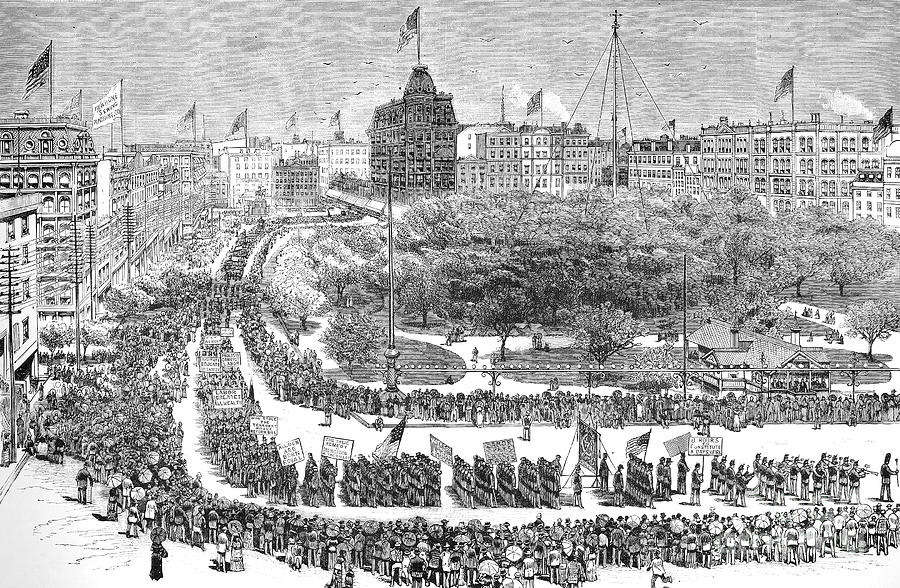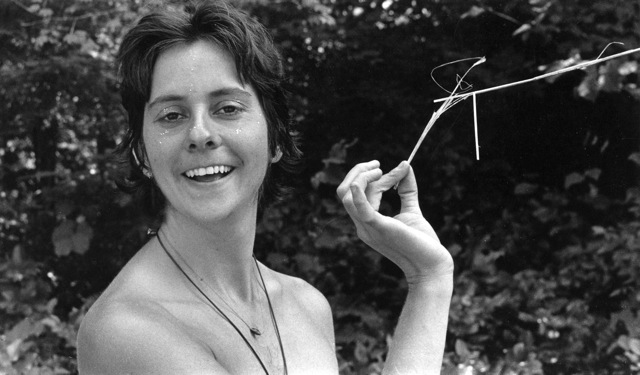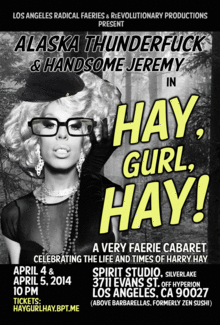content in between issues, current events, happenings….
August 30, 2014:
 The First Labor Day Parade, New York City, 1882
The First Labor Day Parade, New York City, 1882
The Meaning of Labor Day*
By Gabe Gabrielsky
The meaning of Labor Day has been lost to most Americans, just as is the case with many other holidays such as Independence Day, Memorial Day or Christmas. For most people today Labor Day signifies a great day for bargain sales at retail stores, the beginning of a new school year and most of all the end of summer. In contrast, Labor Day was originally intended to be a celebration for working people in general and by organized labor in particular, was dedicated to the social and economic achievements of working people and constitutes (theoretically, at least) a yearly national tribute to the contributions working people have made to the well being of the nation. In the past, it was celebrated in cities throughout the nation bystreet parades to show the strength and esprit de corps of the labor organizations of the community accompanied by a festival and picnic for the recreation and amusement of workers and their families and speeches by prominent men and women. Today that tradition is no longer observed in most of the nation nor celebrated in the same way as it had been in most cities.
The first Labor Day was held by the New York Central Labor Union in 1882. By 1885 it had become a national event, celebrated by Central Labor Unions in virtually every industrial center of the nation on the first Monday in September, though not yet a statutory holiday. The next year, 1886 a national one-day general strike was called to demand an 8-hour workday. Half a million workers took part nationally but the center of the movement was in Chicago, where a number of other strikes were underway immediately before and after May 1. On May 3 a striking worker was killed by police while picketing outside the McCormick Harvesting Machine Company factory. As a consequence a group of anarchists called for a protest demonstration the next night in Haymarket Square. As that demonstration broke up a bomb was thrown into the police who surrounded the demo, killing a police officer. The police then charged into the crowd firing. While some shots were fired from the crowd, most of the shots were from the police an in the darkness they ended up shooting at each other. In all, seven policemen and at least four workers were killed. About 60 policemen were wounded in the incident and as many as 70 civilians, though it is unclear how many civilians were wounded since many, fearing arrest, chose not to seek professional medical attention.
There was an immediate police crackdown supported by the press and business interests on labor unions, but especially on anarchists and German immigrants. Ultimately 8 German and German-American anarchists were arrested. Only two of the defendants had been present at Haymarket at the time the bomb was thrown, and they were on the speakers’ podium urging the crowd to cooperate with police and disperse. One was sentenced to 15 years and the other 7 to be hanged. Of the seven, two had their sentences commuted to life in prison. One committed suicide the night before the executions and four were executed. The incident got considerable press coverage in the rest of the world and there was considerable support for the Haymarket martyrs outside of the United States.
In the years following the Haymarket incident organized labor in America continued to celebrate both the first Monday in September and the first of May as labor holidays, though May 1 was more a continued struggle for the eight hour day which did not become law until 1937 when the Fair Labor Standards Act was passed. In addition to the continuing struggle for the eight-hour day, May 1 also became an international labor holiday celebrating labor militancy in general and commemorating the Haymarket martyrs.
Following the deaths of a number of workers at the hands of the U.S. military and U.S. Marshals during the Pullman Strike in 1894 Congress, seeking to mute labor militancy with a carrot as well as a stick, rushed through legislation unanimously approving legislation that made Labor Day, the first Monday in September, a national holiday. President Grover Cleveland signed it into law a mere six days after the end of the strike. Thus, the September date that had originally been chosen by the New York Central Labor Union and which had already been observed by labor unions throughout the nation for several years was selected rather than the more widespread May Day date in order especially to disassociate Labor Day from a commemoration of the Haymarket martyrs. Nevertheless, in most of the world, “Labor Day” is synonymous with May 1 in commemoration of the eight-hour day movement, which began in 1886 in Chicago.
* Copyright © 2014 [Robert Paul Gabrielsky] any or all of this document may be reprinted, with attribution, by anyone, anywhere and at any time.
June 6, 2014:
RETHINK LESBIAN RAGE: a crowd sourced blog post on the occasion of pride month and dyke day, los angeles.

image by JD Samson
Lezfem is not dead! It lives on in practices of deep listening, inclusion, processing, and public feeling that carry forward the spirit of utopian politics and messy fractious forms of gender queer togetherness. Let’s share the rage, share the pleasure, and pass it on! – Ann Cvetkovich
Preface to The Imperial Matriarchy of The Future by Carina Finn
It is hard to think of a day when I’m not feeling some form of lesbian rage. Like right now, sitting in the window of my kitchen, looking out at the perfectly gray stormy late-morning and wearing bondage pants and a soft pink skull sweater, drinking coffee that isn’t strong enough, trying to think of the right entrance into my story of lesbian rage, am feeling it. Like every other narrative that attains universality through the personal it could be a tale of woe; blah blah discriminated against & hurt & insulted & ignored me because. Or it could be the preface to The Imperial Matriarchy of The Future, in which we will be able to discriminate against & hurt & insult & ignore whomever we want under the mutually accepted guidelines of consentual non-consent.
As a member of the art/literary, queer, poly, culinary, and BDSM communities, I am constantly re-negotiating the terms of reality. A norm in one may constitute an absolute taboo in another. For example the parameters surrounding pain in a professional kitchen, in the form of burns, cuts, etc., are totally different than those surrounding the same pain-acts in a BDSM setting; both are accepted, expected, but one consents to the receipt of pain in vastly different ways.
The concept of female supremacy is essential to a certain sub-group of BDSM activities, and interestingly enough, to the ones most directly tied to the capitalist economy. The dominatrix or domme, particularly the pro-domme, provides a service for a hefty fee. That service, often enough, is simply existing in a superior state. Many men who seek to serve dommes are self-avowed female supremacists, who derive pleasure simply from the act of admitting to the superiority of the feminine, and engaging in activities of service and worship that solidify this assertion.
That is not to say that the female does not become, in some sense, a fetish-object in this scenario of enacted female supremacy; however, it is possible to be both objectified and to wield an enormous amount of power. The very act of being fetishized is an admission of powerlessness on the part of the fetishist: the fetishist assigns a value to the object of its obsession that surpasses any value within a system of norms, and the fetish-object is thereby superior not only to any other object within the normative system, but to the system itself.
What centuries of female suppression and oppression have done is actually, in a sense, to help restore the feminine to its ancient level of absolute power. The degradation and objectification suffered by women will self-generate a justice. Rather than simply turning the current dichotomy on its head an assigning power to the feminine and weakness to the masculine, the concepts of power and weakness as opposites will ultimately be destroyed.
The miracle of the feminine is its constant, dynamic flow. Like the moon, its easiest metaphor, stagnantion, singularity, are nonexistent in its structure. A society based on this notion of fluidity will have no space for discrimination because discrimination can only exist in a context where a One is superior to an Other. In the Imperial Matriarchy of The Future, in which gender itself will cease to exist as a result of the constant and accepted flow between the masculine and the feminine which occurs in every natural being, there will be no Other.
One of the most frequent sources of rage, for me, is the “feminist” idea that we must be doing battle against an Other, and, in keeping with this idea, that anyone who is not the Other must act in mercenary solidarity to win this battle. Man-hating feminists and militant lesbians are as guilty as members of underground Republican clubs that refuse to allow women of their own ilk access to important political meetings. In order to right the undeniable wrongs suffered by women over the past millenia, it is essential to look towards a future freed from dualisms. The new age in which we currently live is Aquarian; water flows. It is a substance that in every fiber of definition and being the concept of singularity, without which there can be no duality.
From the woods of Oregon!
All members of the Stuck Lip Faeree Tribe
Make Magic with Weed Wands and Pinkies Raised!
Glitter Glam Grrrlls Go !
April 3, 2014: RECAPS TALKS TO ALASKA THUNDERFUCK ON THE EVE OF HER NEW CABARET SHOW: HAY, GURL, HAY!
RECAPS: Welcome back to LA! We are so happy to have you here again. How has the scene changed since you left? What is inspiring you about being back? and what would you like to change or influence in this lovely dystopic/utopic urban sprawl?
ALASKA THUNDERFUCK: Actually I was surprised at how little has changed. My friends based here in LA are still the faithful, loving people they were when I left 4 years ago. The main difference is now Scruff and Grindr exist.
RECAPS: How did you encounter the Radical Faeries?
ALASKA: I can’t remember because I used to drink a lot. But I think it goes back to New York City, where I have a lot of RF friends and loved ones. My musical partner Jeremy Dingles Apollo AKA Crystal Powers and I put on the Chakra Cabaret many years ago in Le Petit Versailles on the lower East Side, and it was one of the first endeavors we ever produced together. It will always be a part of us, and that show was the debut of The Fisting Song!
RECAPS: How has the RF style and philosophy of drag influenced Alaska Thunderfuck?
ALASKA: I see RF drag sensibility to be very free and very flamboyant, which is definitely something from which I, especially in my early days, draw much inspiration. Alaska is most at home when she is free-balling under a flowing skirt with flowers in her hair, rather than corseted to the gods under 8 pairs of dance tights.
RECAPS: The next issue of RECAPS is focused on the environment, in part through the lens of queer politics. How if at all has this project made you rethink your relationship to the ultimate drag mama: planet earth?
ALASKA: We’ve been experiencing earthquakes here in LA leading up to this event, and I think that Mother Earth is letting us know that things are changing, and things are shifting.
RECAPS: Relatedly, tell us some of your secrets about turning trash into treasure!
ALASKA: 99 Cent Store. Enough said.
RECAPS: The Radical Faeries and Haus of Haunt both have relationships to the occult, how would you describe your relationship to magic?
ALASKA: Shh…
RECAPS: What are the radical aspects of Harry Hay that you are hoping to embody, translate and share with a new audience who might not know his role in LBGT and leftist histories?
ALASKA: The decision to dedicate this show to Harry Hay and his life and legacy came from a place of wanting to educate the new ,younger generation– but it has actually reminded me how little I know actually know about queer history. In order to educate the new generation, the current generation must also know their shit. So I’m attempting to learn my shit a little bit, because Harry Hay definitely knew his.
RECAPS: What is your favorite song or number you created for Hay, Gurl, Hay! ?
ALASKA: Well, I don’t want to give away any surprises, but Jeremy and I always put a lot of love into our musical choices. And I love the Fisting Song.
RECAPS: Season 6! What queens are you rooting for?
ALASKA: I love Gia Gunn, and I have a secret crush on Adore Delano. Don’t tell anyone.
RECAPS: What creative endeavors are on your horizon?
ALASKA: I’m traveling a lot, and getting to share what I do with people around the world, which I love. I also see some more music and video projects coming down the line– so stay tuned… and go buy Ru Girl on iTunes.


